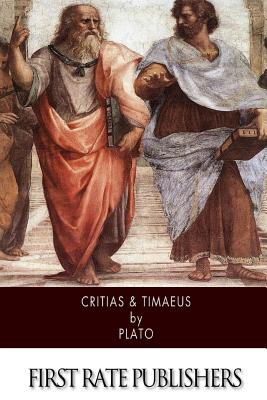Critias & Timaeus

Critias & Timaeus
In 427 B.C., the Ancient Greek city-state of Athens was flourishing. Approximately 80 years earlier, the Athenians had formed the first self-representative democracy in history, the Peloponnesian War against Sparta had only just started, and Socrates was only beginning to lay the foundation of what would become Western philosophy. That year Plato was born to a wealthy family: with an uncle who was close friends with Socrates, Plato was seemingly destined to become a philosopher. By the end of his life, Plato had indeed become the foremost philosopher of his time, and perhaps the most famous philosopher in Western history. Like many males of the period, Plato served in the military and dreamed of a political career. And Plato did hold political office after the Peloponnesian War ended in 404 B.C., but around that time he also became a loyal follower of Socrates, who was teaching philosophy at an academy in Athens. None of Socrates' works survived antiquity, so most of what is known about him came from the writings of his followers, most notably Plato. What is known about Socrates is that he seemed to make a career out of philosophy, and Plato was intent on following in his footsteps. Yet for all of the influence of Socrates' life on Plato, it was Socrates' death around 399 B.C. that truly shaped him. Plato was so embittered by Socrates' trial in Athens that he completely soured on Athenian democracy, and he began to travel around the Mediterranean, studying topics like mathematics, honing his approach to philosophical thinking, and continuing to refine his philosophical beliefs. About a decade later, Plato returned to Athens and founded his famous Platonic Academy around 387 B.C., which he oversaw for 40 years until his death. One of Plato's philosophical beliefs was that writing down teachings was less valuable than passing them down orally, and several of Plato's writings are responses to previous writings of his, so Plato's personally held beliefs are hard to discern. However, Plato educated several subsequent philosophers, chief among them Aristotle, and his writings eventually formed the backbone of Western philosophy. Timaeus is one of Plato's dialogues, mostly in the form of a long monologue given by the title character, written circa 360 BC. The work puts forward speculation on the nature of the physical world and human beings. It is followed by the dialogue Critias. Speakers of the dialogue are Socrates, Timaeus of Locri, Hermocrates, and Criti
PRP: 54.17 Lei
Acesta este Prețul Recomandat de Producător. Prețul de vânzare al produsului este afișat mai jos.
48.75Lei
48.75Lei
54.17 LeiLivrare in 2-4 saptamani
Descrierea produsului
In 427 B.C., the Ancient Greek city-state of Athens was flourishing. Approximately 80 years earlier, the Athenians had formed the first self-representative democracy in history, the Peloponnesian War against Sparta had only just started, and Socrates was only beginning to lay the foundation of what would become Western philosophy. That year Plato was born to a wealthy family: with an uncle who was close friends with Socrates, Plato was seemingly destined to become a philosopher. By the end of his life, Plato had indeed become the foremost philosopher of his time, and perhaps the most famous philosopher in Western history. Like many males of the period, Plato served in the military and dreamed of a political career. And Plato did hold political office after the Peloponnesian War ended in 404 B.C., but around that time he also became a loyal follower of Socrates, who was teaching philosophy at an academy in Athens. None of Socrates' works survived antiquity, so most of what is known about him came from the writings of his followers, most notably Plato. What is known about Socrates is that he seemed to make a career out of philosophy, and Plato was intent on following in his footsteps. Yet for all of the influence of Socrates' life on Plato, it was Socrates' death around 399 B.C. that truly shaped him. Plato was so embittered by Socrates' trial in Athens that he completely soured on Athenian democracy, and he began to travel around the Mediterranean, studying topics like mathematics, honing his approach to philosophical thinking, and continuing to refine his philosophical beliefs. About a decade later, Plato returned to Athens and founded his famous Platonic Academy around 387 B.C., which he oversaw for 40 years until his death. One of Plato's philosophical beliefs was that writing down teachings was less valuable than passing them down orally, and several of Plato's writings are responses to previous writings of his, so Plato's personally held beliefs are hard to discern. However, Plato educated several subsequent philosophers, chief among them Aristotle, and his writings eventually formed the backbone of Western philosophy. Timaeus is one of Plato's dialogues, mostly in the form of a long monologue given by the title character, written circa 360 BC. The work puts forward speculation on the nature of the physical world and human beings. It is followed by the dialogue Critias. Speakers of the dialogue are Socrates, Timaeus of Locri, Hermocrates, and Criti
Detaliile produsului











